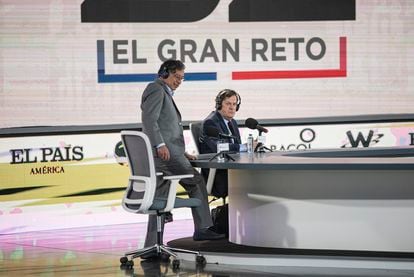Gustavo Petro, Federico Gutiérrez and Sergio Fajardo confronted their proposals in the debate moderated by the journalist Roberto Pombo. Gladys Serrano
Gustavo Petro has been waiting for his opportunity to be president of Colombia for four years.
Hardly anyone doubts his leadership in the current race.
But his victory is far from certain.
In any competition for an absolute majority (of half plus one) such as the one established by the country's Constitution to reach the presidency, the concentration of the vote around two candidates is inevitable.
The two-round system completes the battle: who goes to the final against the candidate on the left?
This question is elucidated in two dimensions: on the one hand, there is viability, that is, who has the power to attract votes to get there.
On the other is the content, that is, who holds positions and promises closest to the wishes of a majority of voters.
With the polls out of focus due to the prohibition maintained by the electoral law, the debates, like the one that took place today in this house between the four heads of the race, become a central instrument for citizens to receive information that allows them to balance their desire for a useful vote with that of a vote close to their principles.
And, when the race has an outstanding leader, that means a fight among the others to be the one to compete with him in the final stretch.
To elucidate who is winning the race without falling into acts of guessing (but always moving, and inevitably, in the field of hypothesis) we can make a comparison exercise: between the positions expressed during the debate and those demarcated by the voters themselves in the recent social thermometer study carried out by EL PAÍS.
These are the multiple distributions of citizenship in a series of issues that mark the general debate in the country, and marked today's particular among the candidates.
How do they fit in with the three who are in competition for that second place that allows them to go to the final?
Since the beginning of 2022, Fico Gutiérrez has been repeating a discourse based on conservative values: family, business, security and tradition as pillars to sustain progress based on economic growth from the private sector and the protection of those values.
He also comes from accepting the support of one of the most established sectors of the Colombian political elite: the one that gathers around former President Uribe.
He does not necessarily brag about the latter, but the connection of his positions expressed today (identical to those of the rest of the campaign) with what he always defended from those instances is obvious.
The problem for him is that he does not seem to be where a majority of Colombians are, who are
far
to the left in economic matters,
something
for the left in values and freedoms, and they find themselves in a situation of dissatisfaction with the institutions and ideological non-alignment that does not go well with a discourse that is, in essence, what the Colombian right-wing has always represented.
The country seems to be at a different point than Fico is now.
That does not mean that it is not electorally competitive: it is;
in the first round, because between 20% and 30% of voters would share their positions in light of the data from the ideological x-ray.
In the second, to pass, it would also be thanks to the fact that Petro is in turn leaning to the left.
But of course his position doesn't seem the best right now.
Aware of this, one could read several of his interventions in today's debate (especially on matters of justice, but also his interest in underlining his proposal for a "basic income for five million Colombians") as an attempt to moderate himself, to seek the new center of gravity of Colombian citizenship.
However, the backpack he carries, which is what has built the image he has among voters,
If the country is for greater economic redistribution, relatively open to individual freedoms (with nuances), in favor of protecting the environment... isn't that what Sergio Fajardo represents?
Haven't those been his banners in today's debate, or at least some of them?
The paradox that occurs with Fajardo is that he, effectively, is not far from the majority on certain key issues.
But Fajardo's job was not so much to be close to the Colombian center as it was to be close to the center of those demanding change.
So to speak: if we exclude that approximate 20% that will always choose the candidate to the right of him, it turns out that Fajardo should maintain somewhat more determined positions in redistribution and institutional change / corruption to be competitive in the first round.
his
adage
of calm change, repeated today once again in all its variants, self-annuls him in that battle.
It remains, then, Rodolfo Hernández.
Unlike Fajardo, he does have access to the conservative vote due to the nature of his speech, which seems careless to many, full of outbursts, but which is actually designed to maximize his connection with social sectors.
He is also especially competitive in the axis of dissatisfaction with democracy, due to his claim to be an
outsider .
of the system.
Aware of his asset, he decides not to go to debates to underline it: it is not (or it is not only) for fear of unforced errors;
It is also to reinforce his position as the only one who can compete with Petro for that 85% of Colombians who are quite or very dissatisfied with democracy.
Lastly, he maintains a combination of conservative positions in the social sphere (but not militants or banners of his movement, as is the case with Fico) and interventionist in the economic sphere (but without damaging the ideas of productivity or private property, as is the case). perceives Petro).
And from there he can reach many corners, many polling places.
It is easier for him, yes, when he does not subject these positions to direct examination.
One more reason to avoid this Thursday's debate.
We can, and in fact we must, criticize these positions of Hernández for their content.
Also his absence.
And his references: he has mentioned Nayib Bukele on occasion, whose government is rapidly moving towards authoritarianism in El Salvador.
But what seems difficult to deny is that he is electorally competitive.
Moreover, in order to criticize in a more refined and well-founded way the substance of his speech, it is necessary to know how the form fits with the Colombian political competition.
Without this prior exercise, the criticism will only fuel the anti-establishment discourse that pushes Rodolfo to the forefront of this electoral fight for standing up to Gustavo Petro.
Meanwhile, Fajardo and Fico used their words this Thursday with the same care with which they are probably counting their votes in the internal polls that the campaigns can continue to do, although they are not published.
And Petro, leader but not winner, can only wait for the next blows without knowing where they are going to come from, but always from the elaborate trench of his rhetoric that has spent a decade building argument by argument: protectionism, redistribution, peace, and assault on the “corrupt establishment” (the phrase changes, the idea remains).
That trench is what allows him to be competitive in debates, and also in votes when it comes to achieving a strong base.
But it is at the same time the main barrier for him to reach that half plus one without which he will not be able to be president.
That is why in the debates he is always comfortable (it was noticed from his late welcome), controlling his well-defended rhetorical space, but the arguments and ideas that he launches during its duration do not manage to project beyond his corner of the ring.
There are many voters there, as the ideological positioning data also corroborates, today more than four years ago.
The country has moved to the left.
But, for now, there is no absolute majority.
Subscribe here to the EL PAÍS newsletter on Colombia and receive all the key information on the country's current affairs.









